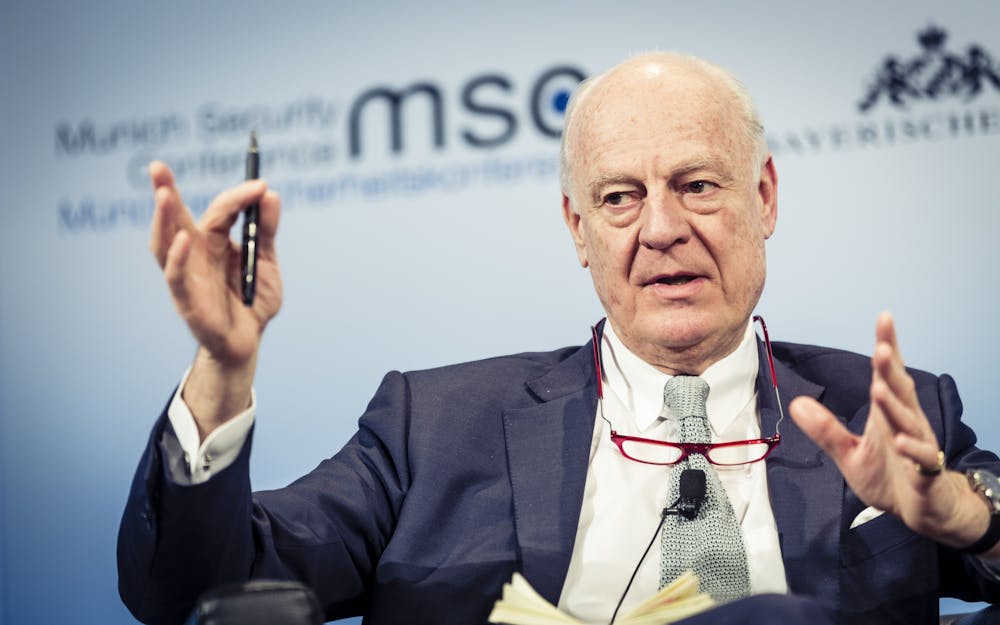Staffan de Mistura is a diplomat who has worked for the United Nations and the Italian government. During his 40 years with the United Nations, he was stationed in countries including Iraq, Afghanistan, Sudan, and Lebanon, and he served as the UN’s Special Envoy on Syria from 2014 to 2018. Throughout his career, de Mistura has focused on humanitarian relief, conflict resolution, and peace-building. He gave a lecture at the Friend Center on Monday afternoon, entitled “Arm-Twisting the Devil: Lessons on How to Limit Harm to Civilians During Times of Conflict.”
The Daily Princetonian: You recently joined the governing board of Interpeace. What are you hoping to work on while in this role?
Staffan de Mistura: Interpeace is a very interesting organization because it was created at the request of the UN, in order to be able to do what sometimes the UN cannot do: work at the grassroots level, when you're talking about political processes or peace negotiations. So, my hope in being on the board, and I've already been attending the meetings, is to contribute with my real-life experience — 47 years in 21 wars. It’s one thing what the manual tells you to do in order to achieve peace, and then another thing to face challenges while you’re doing it…
DP: What’s your advice for students hoping to go into diplomacy?
SDM: First of all, to see it as a mission, because if you look at diplomacy only as a profession, it would not give you enough energy to face the many challenges, frustrations, and tough moments that you will encounter — because diplomacy is complicated. Secondly, you are supposed to learn to listen. Learn languages — not just traditional ones — because by doing that you will have more of a personal contact with your counterpart. Human contacts are very important. Three, never give up, because there will be moments when you have those frustrations, but there is no real alternative to diplomacy. Even when there is a war, at the end the war needs to be solved through a diplomatic engagement.
DP: If you imagine the UN 20 years from now — what’s one thing that will be different about it?
SDM: I would imagine a dream that the Security Council would be more united, which is sadly not the case most of the time these days. Second, that there would be more space for countries who are not members of the P5 to have a say, otherwise they will feel excluded, and exclusion is always dangerous. Three, which is certainly doable and required in order to make the Security Council more credible. Ideally the veto should not be utilized by any members who have the right of veto when there is a clearly identified humanitarian tragedy or human rights crisis, because that has paralyzed often the UN in intervening in those cases and contributed to the lack of credibility of the UN's capacities.
DP: What are some of the factors that need to be in place for a society to transition from conflict to peace?

SDM: The first one is inclusion, the second one is inclusion. Because there is always, in a conflict — whether one side wins and the other loses, or when there is a stalemate, none of them are losing or winning — there's always a basis for lack of inclusion of a minority or of a group of people who feel not represented. That’s one of the reasons why conflicts have started again. When you say inclusion, it means also economic power-sharing and political power-sharing.
Also, trust, which is the second most important element. Inclusion leads to trust, trust leads to genuine discussions about how to run the future of the country. That leads to economic contribution from abroad, because donors or private companies invest when the country's stable. And if that investment takes place, then the economy gets better and people don't feel disenfranchised and frustrated, which gives an entry point for extremism.
DP: What are the implications of the withdrawal of American troops from Syria?
SDM: The biggest implication has been that allies feel that, can they really trust an alliance with the US? This, I'm sure, was a thought [that] must have occurred in Israel and was definitely a feeling that the Kurdish allies of the US have felt. It could even have an implication among European countries, wondering in a case of need, will the US be ready to stick with them as it has in the most recent fifty years at least. There's a need to work that out in order to avoid the feeling that when the US asks to have a group to work with them, will they then be abandoned or not?

DP: Final question that I think the Prince’s readers should know … Which languages do you speak?
SDM: I speak Italian, because I'm Italian, I speak Swedish because I'm Swedish [de Mistura is the son of a Swedish mother and an Italian father]. French, German, Spanish, English and colloquial Arabic … But I'm terrible in mathematics.








